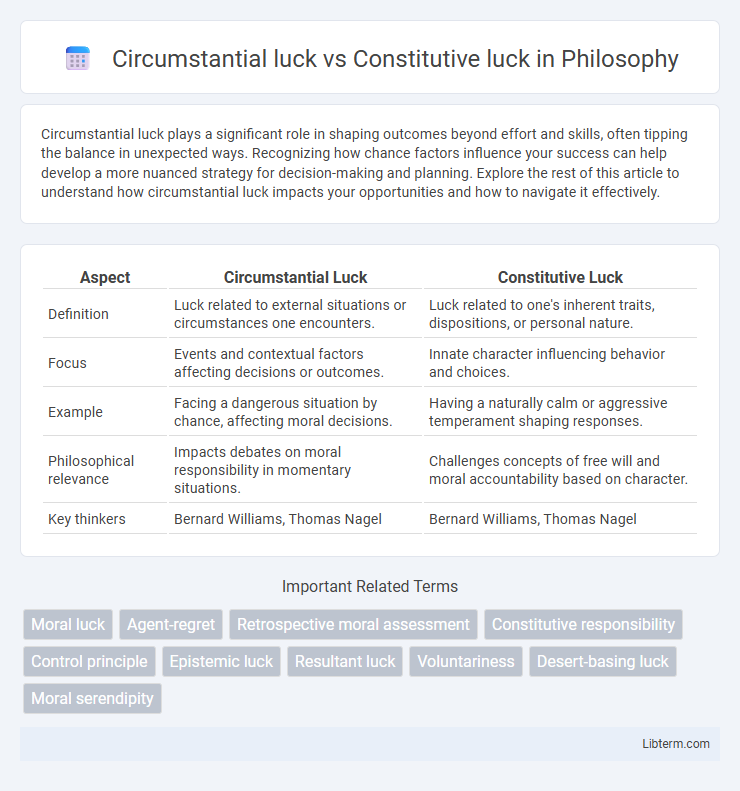Circumstantial luck plays a significant role in shaping outcomes beyond effort and skills, often tipping the balance in unexpected ways. Recognizing how chance factors influence your success can help develop a more nuanced strategy for decision-making and planning. Explore the rest of this article to understand how circumstantial luck impacts your opportunities and how to navigate it effectively.
Table of Comparison
| Aspect | Circumstantial Luck | Constitutive Luck |
|---|---|---|
| Definition | Luck related to external situations or circumstances one encounters. | Luck related to one's inherent traits, dispositions, or personal nature. |
| Focus | Events and contextual factors affecting decisions or outcomes. | Innate character influencing behavior and choices. |
| Example | Facing a dangerous situation by chance, affecting moral decisions. | Having a naturally calm or aggressive temperament shaping responses. |
| Philosophical relevance | Impacts debates on moral responsibility in momentary situations. | Challenges concepts of free will and moral accountability based on character. |
| Key thinkers | Bernard Williams, Thomas Nagel | Bernard Williams, Thomas Nagel |
Defining Circumstantial Luck
Circumstantial luck refers to the fortunate or unfortunate situations individuals encounter due to external conditions beyond their control, such as being born in a stable country or experiencing a natural disaster. This concept highlights how external circumstances significantly influence opportunities and outcomes in life. Understanding circumstantial luck helps clarify the role of environmental factors in shaping a person's success or failure independent of their personal choices or abilities.
Understanding Constitutive Luck
Constitutive luck refers to the inherent traits and dispositions a person is born with, such as temperament, intelligence, and personality, which significantly shape their actions and decisions. This form of luck influences an individual's moral responsibility by determining the very nature of their desires and motivations, often beyond their control. Understanding constitutive luck is crucial for evaluating ethical accountability, as it highlights how much of a person's character is shaped by factors outside their influence.
Key Differences Between Circumstantial and Constitutive Luck
Circumstantial luck refers to the external situations or events affecting a person's actions, such as being in the right place at the right time, while constitutive luck pertains to innate traits or dispositions, including genetics and personality. The key difference lies in circumstantial luck influencing opportunities and experiences, whereas constitutive luck shapes an individual's inherent characteristics and potential. Understanding these distinctions helps clarify debates about moral responsibility and personal achievement.
Real-Life Examples of Circumstantial Luck
Circumstantial luck occurs when an individual's success or failure depends on external events beyond their control, such as being in the right place at the right time during a job opening or avoiding an unexpected accident. A real-life example includes a fisherman surviving a severe storm by sheer chance while others perished, highlighting how external circumstances shape outcomes. Circumstantial luck contrasts with constitutive luck, which relates to inherent traits like personality or intelligence influencing life paths.
Real-Life Examples of Constitutive Luck
Constitutive luck refers to the traits and dispositions one inherits or develops, shaping behavior and decisions, such as a person's inherent intelligence or temperament influencing career success. For example, a naturally extroverted individual may excel in networking professions due to their social ease, while someone with a genetic predisposition for risk-taking might succeed as an entrepreneur. These intrinsic qualities, often outside personal control, play a critical role in determining life outcomes and opportunities.
Philosophical Implications of Both Lucks
Circumstantial luck refers to the uncontrollable events and situations one encounters, while constitutive luck pertains to the inherent traits or dispositions shaping a person's character and decisions. Philosophically, both challenge notions of moral responsibility and free will by illustrating how external circumstances and internal traits influence actions beyond individual control. This duality prompts deeper inquiry into the ethics of blame and praise, questioning the fairness of judgments based on factors outside personal choice.
The Role of Luck in Shaping Life Outcomes
Circumstantial luck refers to external situations and events beyond an individual's control that influence life outcomes, such as being born into a particular social class or country. Constitutive luck involves inherent traits or dispositions shaped by genetics or early environments that impact decision-making and opportunities throughout life. Both forms of luck critically shape socioeconomic status, career success, and personal development by determining starting points and available choices.
Can We Overcome Constitutive and Circumstantial Luck?
Overcoming constitutive and circumstantial luck involves cultivating self-awareness and adopting proactive strategies to influence personal traits and external conditions. While constitutive luck refers to innate characteristics shaped by genetics and early environment, conscious efforts in education, therapy, and habit formation can mitigate its effects. Circumstantial luck, determined by situational factors and opportunities, can be navigated through strategic decision-making, network building, and resilience to maximize positive outcomes despite unpredictable events.
Luck and Moral Responsibility
Circumstantial luck refers to the external situations that influence an individual's actions and opportunities, while constitutive luck involves traits and dispositions one is born with or develops unknowingly. Both forms of luck challenge traditional notions of moral responsibility by questioning the extent to which individuals control their choices and character. Philosophers argue that recognizing the impact of luck necessitates a more nuanced understanding of blame and praise in ethical evaluations.
Navigating Success and Failure Amidst Luck
Circumstantial luck shapes success by presenting individuals with favorable or adverse situations beyond their control, influencing opportunities and obstacles encountered. Constitutive luck determines inherent traits such as intelligence or temperament, which affect responses to challenges and chances for achievement. Navigating success and failure requires recognizing how both types of luck interplay with personal effort and decision-making to optimize outcomes.
Circumstantial luck Infographic

 libterm.com
libterm.com